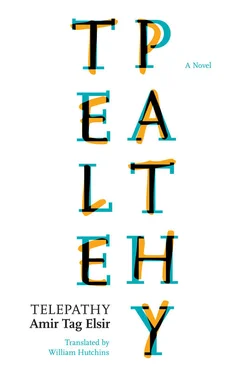When I finally reached my house after three a.m., the street was still busy, in a city that never quiets down. The trappings of a wedding that apparently had taken place on the street in front of a nearby house were visible; drowsy workmen were trying to guard the temporary pavilion and chairs but not faring too well, because I saw a couple of men in ragged clothing put several chairs on a donkey cart and flee with their booty.
I spotted a trembling shadow in front of my house. Thinking that it was Nishan Hamza, I felt alarmed and drove around the block a number of times. When I returned, no one was there. I realized I would never fall asleep and would pass the remaining hours before the morning’s commotion as a wakeful fool, waiting impatiently for the arrival of all the bustle so I could slip into it, pursuing any openings it might provide me with.
I sat at my desk in the living room, which was crammed with books, and turned on the computer. I cast a quick glance at the Kuala Lumpur file, and it seemed to me that what I had written thus far was merely contemptible scribbling on the wall of a novel that was destined to go unwritten — during a period when no novels would be written.
The Chinese acupuncturist Tuli was there, and the features that made him so striking had begun to be sketched: his lavish elegance, his carefully crafted smile and the way he bowed repeatedly before every visitor and rubbed his fingers from one moment to the next. But I felt in no mood for him — not at all. For the American-Japanese Leftist Hoshika I had chosen a perilous future in a country that he did not comprehend. He would never live to be a hundred here, although that was what he aspired to. I had sketched the secretary Anania Faruq, outlining her eyes with antinomy, decorating her hands with dark henna patterns, and dressing her in an embroidered Sudanese thobe. I had reached the stage of planting her in potting soil so that she would grow to be captivating but fully capable of inflicting harm. I was in no mood for her now and felt opposed to any attempt to revive her. I wouldn’t proceed any further with her in the text.
There was a Chinese alcoholic named Yanyan, who had a room near mine in the Kuala Lumpur hotel where I stayed. He would knock on the door of my room every night for no apparent reason. I had made him an entrepreneur visiting a country that lacked the wherewithal for drunkenness. I depicted him undergoing the distressing complications of alcohol withdrawal. Now I would leave him dangling as well.
I closed the folder of my thoughts and entered the world of Facebook in an attempt to forget what was happening around me. I stumbled upon Najma’s traces. She had switched out her personal photo for one that showed her without a headscarf and with her hair permed. She had written a number of lines about her event with Professor Hazaz. As usual there were hundreds of likes and comments. Some of her friends criticized her for not inviting them to the event. I added my “like” and wrote: “What a splendid evening!” I quickly clicked on another page which seemed like a treasure to me, of a girl calling herself Nariman. That might actually be her name or perhaps it was a fantasy nom de web for a world that was both open and frequently conservative. On her page she had assembled friends who could never have assembled in real life. Among those friends were bearded and turbaned men who had fallen head over heels for the temptation she represented. They referred to her as “Virtuous Sister” and competed with each other to describe qualities of which they were ignorant and to write what they referred to as chaste love poetry about the eyes in the picture posted showing a girl wearing a niqab that revealed only her eyes. She wrote verses, discussions, and aphorisms and advocated virtue as well. Her friends included enigmas like Bird Milk Vendor, the Anti-Christ, Mobile Charger, Tartura Sorceress of the Happy Home, Wounding Breeze, and I’m the Chameleon. Many wrote silly remarks, discussed their frustrations, or were content to add a swift “like”.
I read a new poem by someone calling himself Sheikh Ma‘ruf. It celebrated the large eyes on a face that was radiant even when covered. There was a pressing call from a person — Love-Struck Rural Guy — for her to remove the veil from her picture and simply wear a headscarf to show her piety or to send him an altered photo in a personal email because he had a surprise for her. Since a clear picture of a Kerry Cleaning Machine was at the center of the page for no apparent reason, someone had written: “We need that to clean our hearts.”
I smiled and left this unfamiliar atmosphere. I returned to my own page and wrote: “Telepathy.” I didn’t expect any comments. I closed the page on that strange world, filled with everything a novelist needs.
Suddenly I remembered the folded page in Hunger’s Hopes — page 120 — and began to rummage through my shelves for the novel, now that the state of neutrality that had seized hold of me after midnight had lifted. I was sure I still had a number of copies somewhere but couldn’t think where I had put them. I searched my living room, where most of my books were shelved, with mounting anxiety. Then I moved to the two rooms I use as branch libraries. I discovered all the works I have written, even those I have dropped from my vita and never mention in statements or interviews. I didn’t find my most recent novel, although I had to have at least one copy of it. Perhaps I had given all the copies to my friends. Perhaps I had put them some place I couldn’t remember. Perhaps I was daydreaming and had never written a novel called Hunger’s Hopes . I finished my search of the house, looking even in my bedroom where only my slumber or insomnia intrude, although I was certain it wouldn’t be there. I went outside to search the car, where I triumphantly found two copies in the boot.
I lit a cigarette and impatiently opened the book to Nishan’s page. I began to read noncommittally, like any neutral person without a vested interest in the topic. I wanted to check where Nishan actually was, even though I could almost recall the entire novel and could replay it in my mind, as I had at the Social Harmony Club. He himself had told me where to find him in the novel.
I read:
For the second year in a row, something happened to Nishan Hamza during August, which was hot and humid despite an occasional, autumnal cloudburst, to shake his stability and ambition. It was after Nishan filed his application for admission to the national university, just when it seemed that he would be admitted and that his ambition to study law and become a judge would be realized. Many of his acquaintances and neighbors in that neglected district had mocked his desire, asking, “Why law school, Nishan?”
He had replied with a laugh, “In order to prosecute Sahla the hairdresser for oiling women’s hair.”
In the district, people were organizing a number of voluntary campaigns at the same time. One set out to spruce up the district at the behest of residents who knew nothing about sprucing up besides the words. A campaign against disturbing the public order was led by Mas‘ud the Nurse, who was without doubt the greatest threat to public order in the district. They entrusted to Nishan the leadership of a third, exceptional campaign against envy.
But who was there to envy in this impoverished place? What was there to envy among people who were alike even with regard to constipation and diarrhea and to the way they were ground between the jaws of misery and hunger?
“Just lead it, Nishan.”
He led the campaign but discovered — as the low, mud-brick houses or the dwellings made of random scraps of corrugated metal did too — that everyone in the district was envious and envied. One man envied another his tunic, which was washed and starched, while someone else envied the first man his shorts, which didn’t have a single rip or patch. One fellow envied a beggar his mellifluous voice that attracted almsgivers, but the beggar envied him his full head of hair. One woman envied her neighbor for being able to light a cook-fire that day, and the neighbor envied her for having a son who was taking enlistment exams and might become a soldier.
Читать дальше












